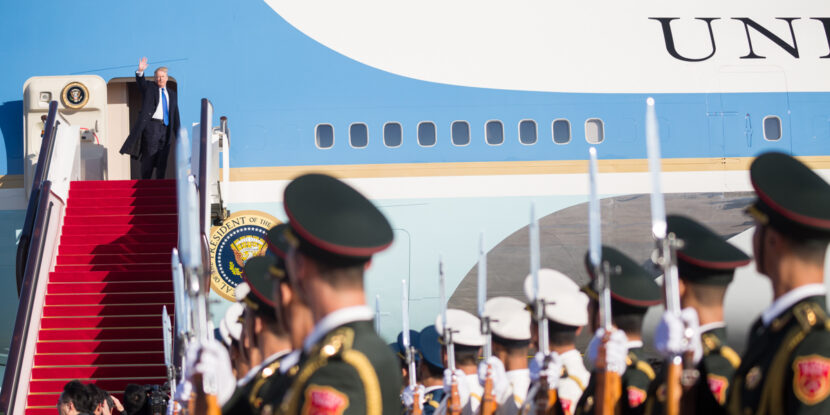
PULSE POINTS:
❓What Happened: A federal judge ruled in favor of the Trump administration, requiring anyone in the U.S. illegally to register with the federal government and carry documentation.
👥 Who’s Involved: Judge Trevor Neil McFadden, President Donald J. Trump, and DHS Secretary Kristi Noem were central figures in this ruling, alongside the Department of Homeland Security (DHS).
Your free, daily feed from The National Pulse.
📍 Where & When: The ruling occurred in a federal court and will go into effect Friday.
💬 Key Quote: DHS Secretary Kristi Noem stated, “President Trump and I have a clear message for those in our country illegally: leave now. If you leave now, you may have the opportunity to return and enjoy our freedom and live the American dream.”
⚠️ Impact: The ruling enforces a longstanding requirement, extending to non-U.S. citizens who must register and provide fingerprints. Noncompliance can lead to fines, imprisonment, or deportation.
IN FULL:
A federal judge upheld the Trump administration’s policy requiring individuals in the U.S. illegally to register with federal authorities and carry documentation or else face stiff financial and criminal penalties. On Thursday, U.S. District Court Judge Trevor Neil McFadden ruled that a group challenging this requirement lacked the standing necessary for their claims to be considered. The decision will begin to take effect on Friday.
The Department of Homeland Security (DHS) emphasized that individuals without legal status who have been within U.S. borders for longer than 30 days must comply with this registration requirement. “President Trump and I have a clear message for those in our country illegally: leave now. If you leave now, you may have the opportunity to return and enjoy our freedom and live the American dream,” DHS Secretary Kristi Noem said, reiterating that illegal immigrants should leave the United States before they are either forcibly deported or face other legal action.
President Donald J. Trump‘s imposition of the registration requirement and financial penalties for those who fail to comply is rooted in provisions in the Immigration and Nationality Act of 1952. The legislation outlines various measures to monitor illegal immigrants and encourage them to depart voluntarily.
Adhering to these provisions requires anyone aged 14 and older without legal status to provide their fingerprints and current address. Canadians staying in the U.S. for over 30 days also fall under this mandate. The Trump administration underscores the importance of these laws for maintaining national safety and security.
The registration concept isn’t new, having been applied more stringently after September 11, 2001. Back then, males 16 and older from select countries were required to register, a program that was later suspended in 2011 and ultimately dissolved in 2016.
The DHS has been proactive in notifying illegal immigrants since February, warning of substantial consequences for those who fail to comply.

PULSE POINTS:
❓What Happened: China increased tariffs on U.S. goods to 125 percent in response to U.S. tariff hikes on Chinese products.
👥 Who’s Involved: China, the United States, President Donald J. Trump, and the Chinese Ministry of Finance.
Your free, daily feed from The National Pulse.
📍 Where & When: The announcement was made on Friday.
💬 Key Quote: “The U.S.’s imposition of abnormally high tariffs on China seriously violates international economic and trade rules…” claims China’s Ministry of Finance.
⚠️ Impact: U.S. products, including soybeans, pharmaceutical drugs, and airplanes, are affected; tensions between the two nations rise, with implications for international trade systems.
IN FULL:
Beijing is striking back against the United States, imposing a 125 percent tariff on American goods. The move follows U.S. President Donald J. Trump clarifying on Thursday that the effective tariff rate on Chinese imports now stands at 145 percent, up from the previous 125 percent.
Among American goods falling under the new Chinese import duties are soybeans, pharmaceuticals, and aircraft. The duty on soybeans is likely to be the most impactful, as while China exports far more to the United States than it imports, the American goods that China does buy tend to be agricultural.
In announcing the new trade measures, the Chinese Ministry of Finance accused the United States of violating international trade norms and engaging in economic coercion. “The U.S.’s imposition of abnormally high tariffs on China seriously violates international economic and trade rules,” claimed the ministry.
The U.S. had cited China’s involvement in the fentanyl trade as a factor for the tariff increase. President Donald J. Trump has been vocal about what he perceives as China’s long-standing unfair trade practices against the U.S., cautioning Beijing against further retaliation. Trump’s recent statements emphasize the need for China to recognize that its economic practices are unsustainable.
In response to the U.S. tariffs, Chinese officials maintain that the new rates leave no viable market for American exports to China. “If the U.S. continues to impose tariffs on Chinese goods exported to the U.S., China will ignore it,” the Chinese ministry remarked. However, it is important to note that China—a surplus economy—is far more reliant on the U.S. purchasing Chinese goods than vice-versa.
China appears to have halted efforts to defend its currency, the yuan Renminbi, against the U.S. tariffs. After initially devaluing earlier in the week, the yuan began to appreciate again last night. Notably, the Chinese purposefully devalue the yuan to give the country’s exports a competitive advantage in global trade.
show less

 2 months ago
3
2 months ago
3








 English (US) ·
English (US) ·